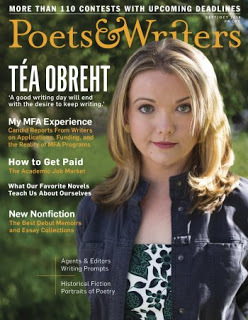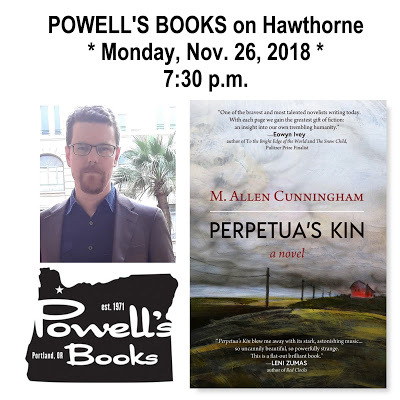M. Allen Cunningham's Blog, page 8
September 13, 2019
M. Allen Cunningham's New Book Q&A: First Teaser
Q&A will appear from Regal House Publishing, fall 2020.
Published on September 13, 2019 14:27
September 12, 2019
New Interview in Poets & Writers
 The current issue of Poets & Writers (Sept/Oct 2019) features my extensive interview with Ben George, Senior Editor at Little, Brown and Company.
The current issue of Poets & Writers (Sept/Oct 2019) features my extensive interview with Ben George, Senior Editor at Little, Brown and Company.Our wide-ranging conversation touches on the day-to-day experiences of a New York editor, the role of luck in publishing, the value of mentors, what it's like to spend an hour discussing a single paragraph, the plight of "midlist" writers, and lots more.
"In any editing experience you have to make the art the most important consideration, even as you keep the artist’s personal feelings in mind while you’re doing that. This is why I feel so privileged. As the editor, I’m being invited into the workshop, where there’s sawdust on the floor and half-finished things. It’s a delicate space for the writer. You’re being trusted, and you need to acquit yourself well." -Ben GeorgeRead the complete uncut version of the interview online HERE .
Published on September 12, 2019 11:48
September 9, 2019
Tell Yourself the Ages Are Listening
Artists and writers: At some point, or several points, you’re going to receive the message that your work is insignificant, that your commitment to the work is futile, that you and what you represent as an artist do not matter.
At some point, or several points, you’re going to wonder what use there is in continuing to do and share your work.
It’s unlikely that you will escape this unpleasantness. But when it arrives, remember that almost nobody escapes it — that you’ve come to a new threshold, and this one also you can cross as you’ve crossed other thresholds before it.
Take the upleasantness as a sign of your progress, of the strength of your commitment to the work. Take it as a reminder of how far you’ve gone, and as a renewal.
Face the deafening silence, let outright rejection wash over you. Then say to yourself, if you can, "Art is freedom, beginnings are beautiful, rebeginnings even more so," and honor your practice by showing up even when nobody else will — especially then.
You’re strong of heart, with fire in your belly, and you’re endowed with gifts and disciplined in the daily work, the lifelong work, of honing these gifts.
From the start you knew this work would be one of the hardest things you could choose to do. Stand back and realize: there’s no surprise in this turn of events. Don’t look around for those more “lucky” than you.
Don’t review your prior hours and days in terms of “waste.” And don’t think in terms of “arrival,” only in terms of the work at hand. Not “accomplishments,” only beginnings.
Give yourself, if necessary, to posterity, or to your ancestors. Tell yourself the ages are listening. Do what you have to do to reorient yourself.
Then: notice the light in your window, the shape of the words inside you or already there on the paper, the instructions coming through the music even on your thousandth listen.
Ready now, enclosed in frightful privacy, get to work again, if not for yourself then for those of us you may never meet. We’re full of faith in you and we are waiting.
Published on September 09, 2019 10:43
September 3, 2019
Prime Passage: "Good Sentences Are Why We Read" by Joe Moran
Among teachers and critics and in the community of writers, we need more advocates for attunement to the sonic properties of prose. Joe Moran's recent essay on sentence-making consoles me (and probably also the underrated writers I most admire). I immediately printed it out for use with my creative writing students. Here's a prime passage, but follow the link at the end to read the whole."When the writer has a tin ear for the sound of a sentence then the reader knows, just as when she hears flat or pitchy singing, that something is wrong, even if she can’t quite say why.I can let a book fall open and tell, just from reading a few sentences, if I will like it. However compelling the subject of a book might be, I find it hard to carry on reading if its sentences are boring. I should be more forgiving, since I have written my share of boring sentences. I am not. Neither are you, even if you don’t know it yet. You think you are looking past this sentence into what it is saying—about life, love, the existence of angels, the design of the injection-molded polypropylene stacking chair, whatever it is— but no. You think you care what this is about, but really you care how it sounds. You are reading it for its sentences." Read the whole wonderful thing at Lit Hub
Published on September 03, 2019 14:20
August 29, 2019
Here's to the Small Books
As we roll toward the fall publishing season of "big" new books, big predestined bestsellers, the next big thing, etc., I would just like to say...
Here’s to the small books, the unsung writers, the unreviewed, the unbought and unawarded, the authors and poets quietly refashioning form from the margins and undaunted by the unlikeliness of success let alone a living.
Here’s to the denizens of the disappearing midlist and their beautiful literary disappointments. Here’s to those at the bottom of the Bookscan barrel.
Here’s to the readers who write and who hope to write, the keepers of commonplace books, the worried ones haunting their neighborhood independent and holding out against Amazon.
Here’s to the editors standing sentinel for the living voice, who circumvent or defy the deadening sales conference. Here’s to the individual publishers carrying more than their weight in a march to keep the word alive, even and especially where the profit potential is nil.
Here’s to the authors who help, especially the authors who have the means or hold a megaphone and turn these to the work of encouraging, supporting, and sustaining the less lucky.
Here’s to the writers who teach in order to instill creative freedom, clarity of thought, a spirit of experimentation, & a fidelity to voice & form however unconventional. Here’s to the small literary magazines & the volunteers who produce them for the pure love of literature.
Here’s to the literary souls who staff our independent bookstores and who, for every predestined bestseller, strive to lift up 10 small unlikely works.
Here’s to the unnominated, the unconnected, the unincluded and uninvited best of the best working without encouragement or reward. You’re there, you’re for real, you keep us going.
Published on August 29, 2019 12:49
August 25, 2019
Honorable Obscurity, John Steinbeck Edition: "A Little Miserable Popularity"
John Steinbeck to his literary agent Elizabeth Otis, 1935:
Steinbeck to Joseph Henry Jackson, 1935. Upon learning that Tortilla Flat had won the gold metal for best novel from the Commonwealth Club of California, Steinbeck insisted that he could not attend the awards dinner:
"Curious that this second-rate book [Tortilla Flat], written for relaxation, should cause this fuss. In your dealings you need make no compromise at all for financial considerations as far as we are concerned. Too many people are trapped into promises by gaudy offers...we've gone through too damned much trying to keep the work honest and in a state of improvement to let it slip now in consideration of a little miserable popularity. I'm scared to death of popularity. It has ruined everyone I know...I suppose it is bad tactics but I am refusing the usual things--the radio talks, the autograph racket, the author's afternoons and the rest of the clutter--politely, I hope, but firmly."
Steinbeck to Joseph Henry Jackson, 1935. Upon learning that Tortilla Flat had won the gold metal for best novel from the Commonwealth Club of California, Steinbeck insisted that he could not attend the awards dinner:
"Nothing like this has ever happened to me before. The most I have had to dodge has been a literary tea or an invitation from a book shop to lecture and autograph. This is the first and God willing the last prize I shall ever win.
The whole early part of my life was poisoned with egotism, a reverse egotism, of course, beginning with self-consciousness. And then gradually I began to lose it.
In the last few books I have felt a curious richness as though my life had been multiplied through having been identified in a most real way with people who were not me. I have loved that. And I am afraid, terribly afraid, that if the bars ever go down, if I become a trade mark, I shall lose the ability to do that. When I do I shall stop working because it won't be fun anymore.
This is not clear, concise, objective thinking, but I have never been noted for any of those things. If I were a larger person I would be able to do this and come out of it untouched. But I am not...I have no social gifts and practically no social experience..."
Published on August 25, 2019 10:31
February 11, 2019
Audio Dispatch: In Ludwig's Room (with music)
To be in these rooms with this music in your ears is to sit for at least a few moments in Beethoven's mind and body. His music seems to grow more and more miraculous.
Listen to "In Ludwig's Room" on Spreaker.
Listen to "In Ludwig's Room" on Spreaker.
Published on February 11, 2019 11:16
January 9, 2019
Interview with a Recluse (with music)
We are writing it down. Always we are writing it all down.
Listen to "Interview with a Recluse by M. Allen Cunningham" on Spreaker.
Listen to "Interview with a Recluse by M. Allen Cunningham" on Spreaker.
Published on January 09, 2019 16:06
November 24, 2018
Portland area friends, please come on out to P...

Portland area friends, please come on out to Powell's Hawthorne (3723 SE Hawthorne) on Monday 11/26! I will discuss the 11-year germination of Perpetua's Kin , share anecdotes from my research, and read from this novel that Powell's bookseller Dianah H. calls "Gorgeous. Devastating. Lyrical. Addictive." (There will also be cookies.)
https://www.facebook.com/events/1125532894238690/
Published on November 24, 2018 17:36



